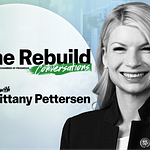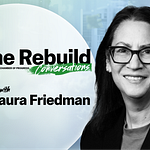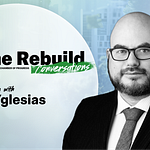Prof. Gary Winslett: Congressman Peters, it is so nice to have you here on The Rebuild. We're really excited to talk to you.
Rep. Scott Peters: Thanks for having me.
Prof. Gary Winslett: Yeah, love to do it. Let's dive right in.
So I was reading in the Wall Street Journal just on Sunday that consumers should expect electricity prices to go up this Summer.
And yet I was also reading a few weeks ago about how congressional Republicans on the Ways and Means Committee and the Energy and Commerce Committee are taking aim at green energy–even trying to zero out programs that are helping transmission get sited and built even while we know we need more electricity to keep people's energy prices down.
I know this is an issue you've worked on for a while, and are going to be focusing on this new Build America Caucus. So what I want to first ask you about is just what are some of your ideas for reforming some of these permitting processes so that we can accelerate Green Energy deployment?
Rep. Scott Peters: Well, Professor, you're alluding to that pesky supply and demand problem, right? I mean, that's. That's it. I would say for the first time in some decades, we're going to see an increase in demand for electricity because of AI, because of reshoring manufacturing, both under policies driven by President Biden, President Trump, electrification–that load growth not only challenges our supply, but threatens to destabilize the grid.
We learned also from Jesse Jenkins at Princeton that if we want to realize the climate benefits of the IRA–the biggest investment in climate action in the history of the world–we need to triple the size of the grid because you need to get solar energy from places like Arizona and wind energy from places like Iowa to the places where they need it.
We're really challenged to do that. And I think as a result of that, we face a choice in the future between higher electricity prices and astronomically higher electricity prices.
Rep. Scott Peters: So we've got to get on the job. And as you alluded, I think there's a tremendous amount of clean energy about to be connected. We have 2,600 gigawatts in line to be connected, projects to be connected. A gigawatt is roughly the size of a nuclear power plant. So that's a huge amount of energy. About 90% of that is non-emitting. And so if you're interested in climate action, you're interested in energy supply, got to get that stuff online and we ought to make everything faster.
So the challenge we've seen is that, as proud as I am of being a Democrat who voted for the Inflation Reduction Act and all that climate action, we just didn't get it into the ground. And it doesn't do us any good to have money in the bank unless we get into the ground.
So a lot of what we're seeing now is the difficulty of process we've got. It takes, you know, four, four and a half years to do a big environmental impact statement, another four years to litigate that for, for transmission projects, it's much higher. And so we've got to, we've got to come and modernize our environmental laws in line with that.
Rep. Scott Peters: So some of the ideas we have are first of all on transmission, you know, we'd like to pursue parity with natural gas. Natural gas is a one stop shop. You go to, you go to FERC and they're the lead agency we have. The FASTER Act, which we've introduced, would designate FERC as the lead agency for large interstate transmission lines as well.
It's a little more complex. Complicated because they're visible–they're overground. But it's a way to coordinate federal, state and local authorization and reduce the big timeline for those things.
A second challenge is that we know we need to connect various regions and there's no incentive for interregional cooperation. So Senator Hickenlooper and I have the Big Wires act, which would require each region to be able to transfer at least 15% of its power to another region.
That would have really helped Texas when they had their tough weather, when that awful storm where they lost people because of cold. It's a reliability issue, but it's also a cost issue.
Then I think we'd like to just generally look at the environmental laws like the National Environmental Policy act, NEPA, to see if we can't make things go faster. It was just that if you're a climate advocate, we're in the mode of needing to build stuff. If 90% of what wants to be built is non-emitting, let everything go faster. Because if you put down 10 to get 90 back, the second time you do that in a casino, you get kicked out. That's a pretty good deal.
Prof. Gary Winslett: Yeah, for sure. I actually wanted to focus on that FASTER act a little bit because I think this is something a lot of people don't realize is that FERC treats natural gas one way where it has national siting authority.
If you want to build natural gas from Oklahoma to Virginia, FERC has the ability to do that and, and they really don't in electricity transmission. So giving FERC that authority, you're really just putting Green Energy on parity with natural gas.
Rep. Scott Peters: 100%. We've actually got something called backstop authority. I'm sure you've heard reference to, which is the idea that, you know, we designate these, these national corridors and you know, nothing gets built in them because there's no incentive to cooperate.
And so we've sort of said to FERC, okay, we'll give you a backstop authority. If they don't build it in a certain amount of time, you can order it. But that was a provision that was started in one form in 2005. And in the Bush administration, Obama, Trump One, and Biden, it was never used. So I think we have to come up with a different way.
We think the FASTER act would be sort of a way people can understand it because they've seen it work with natural gas.
Prof. Gary Winslett: Yeah, exactly. Well, and the other thing that I really like about both of these bills is they're both low or even zero cost to the taxpayer. Like, these are smart ideas without being budget busters.
What's been a surprising obstacle to you? It seems like such a common sense idea to me once you, you lay it out. What has been a surprising obstacle to you in the FASTER Act, the Big Wires Act?
Rep. Scott Peters: Well, in general, I think, you know, there's, there's a surprise on the Right, there's a surprise on the Left. The surprise on the Right is sort of a lack of concern about transmission. I think maybe 10 years ago you would have seen…well, in 2005 when the energy act was passed, this was well before solar and wind had been deployed.
It was really a reliability issue. We were trying to recover from the big blackout we had in 2003 was a nationwide blackout, basically by one failure in Ohio. And so the idea was connections would provide more reliability. And that was really the first attempt to really get the grid going.
But now there's been the deployment of solar and wind and people, I think wrongly on the Right see that this is competition for oil and gas, which is not. We need all the power we can get.
That's what you've seen the deployment in North Dakota, in Texas, of tons of wind. I mean, Texas has more wind, I think, than any place but China, literally. And it's not like they're a bunch of tree huggers in Texas. They make smart energy decisions in kind of the most perfect energy market from a freedom of choice standpoint.
So that's a surprise. I don't think it's ideological to… take a grid that's old and small and dumb and make it bigger, faster and smarter.
Rep. Scott Peters: And then on the Left, I think you see, you don't see appreciation for the cost of time. And you know, I think in the 1970s, we, the environmental movement was trying to stop bad, bad things from happening. We passed NEPA so that you at least consider the environmental effects of every decision you made that was significant and consider the alternatives. And that's very reasonable.
But now we've gotten so used to slowing things down and litigating over them. We have to realize that the things we're slowing down are things like offshore wind and, and, you know, utility scale solar and transmission lines and, you know, hydrogen pipelines, carbon, carbon dioxide pipelines.
The things we need for climate action are stuff we have to build.
And on balance, if we build more, even if some oil and gas gets through, we're going to win in terms of emissions reductions. So those are the tensions we have. I think people are coming to understand that we need more electricity and that with the demand for so much more electricity, we're all going to have to come together. And I think these will all be parts of the solution.
But you know, the politics sometimes interferes with the analytics.
Prof. Gary Winslett: No, totally agree. I teach my students a course on Climate Change and markets. And one of the things I like to say to them is that I grew up playing football. Like the old environmentalism was about playing defense. Like stop.
The new environmentalism, we got the ball, we want to play offense, we want to build things.
Rep. Scott Peters: Yeah. And want actually to, you know, pick up yards, pick up yards and touchdowns.
Prof. Gary Winslett: Right. Like that's what it is. Climate touchdowns for sure. I want to also ask you about health care as well. So the Inflation Reduction act actually used a lot of your ideas about Medicare drug price negotiation from this Reduced Cost and Continued Cures act you had written.
I don't think a lot of people know that. So I would just love to hear you talk about how you came up with some of these ideas and then what are some other ideas you have to reduce healthcare cost?
Rep. Scott Peters: Yeah, so it was a big, it was a difficult time for me. Speaker Pelosi had this HR3, her bill on getting for the first time Medicare to be able to negotiate the prices of drugs. And of course that makes sense. Right. But the problem with it was that she wanted to start negotiation sort of almost price setting the day the drug came out.
Now I realized that that meant that no one would ever invest, invest in risky drug discovery because if you don't have an opportunity to make a profit back on your risk capital, you won't invest it. You'll invest in real estate or something else. And you know, we invest about $47 billion now in the NIH in public research.
The comparable number in the private sector was over $100 billion. And we put that at risk if we set this thing up wrong. So I just said let's give a patent period to these drugs so that you know, once something's invented, they get there. You know, we propose 12 years to, or 11 or 12 years to recover that money.
Rep. Scott Peters: And I think she did not believe that I was going to stick to my guns. But I just knew that for San Diego in particular–we're the third leading biotechnology cluster–this is a really important part of our economy. We have big employers like Eli Lilly and Johnson and Johnson Novartis.
But a thousand companies doing this with 80,000 people. A thousand companies, that means there's a lot of small outfits trying to solve hard science problems with private risk capital. And we wanted to keep that going.
So I did stick to my guns. You've got tons of protests. I was threatened with primary opponents by the Democratic Party. I actually voted against our reconciliation bill as a member of the Budget Committee on the Democratic side. Took tremendous blowback. Everybody in my district office became an expert in explaining the economics of drug discovery and investment.
Rep. Scott Peters: We got through that. We did get the change made that we wanted to, and I think we came up with a better bill. It's not a perfect bill, but Democrats are all very happy that for the first time we had the ability to negotiate prices. And you know, it was in a way that, you know, the industry didn't love because it was, it was more restrictive, but it also, it didn't kill it.
And I think there are some more challenges. We're still in competition against China, other countries that want to invest, but this is a place where we have the lead. And so I think that's a good thing.
Another idea–I do think a lot about diagnostics, Gary. There's the attitude sort of in the bureaucracy about innovation is that it's a cost. And one of the problems we face is that when we analyze what something costs in Congress, we only look at this year. So what's the outlay for this year?
Well, in something like diagnostics, which is some tiny percentage of this Medicare spend, for instance, but drives 70% of Medicare decision making, you know, the cost this year is saving money down the line and you're not really getting in as part of the analysis by the Congressional Budget Office, when they analyze the cost, they don't really analyze the benefit of it.
But there's tremendous opportunity with genomics, with blood screening for cancer, with all sorts of innovations now to deploy those things today and save a ton of money down the road. And I want us to think about, you know, taking advantage of those great mostly American inventions to help us provide better outcomes for patients and more cost effective health care.
Prof. Gary Winslett: Yeah, no, I'm totally on board with that. Some of my doctoral dissertation research was on intellectual property and pharmaceuticals, so I've also dug super into the weeds on how you actually try to get this innovation and access. And it's hard, but I think it's really cool that you guys got that drug price negotiation in there while preserving the incentive to innovate. I just, I thought it was really cool.
Rep. Scott Peters: Yeah, thanks. Democrats–I mean, I kind of laugh because they were so mad at me and a lot of them don't remember why. But they were mad at me.
Prof. Gary Winslett: Yeah, well, it's genuinely a challenging problem. The more you get to it, you more you're like, “Okay, well there's some real trade offs here.” So I thought it was cool what you guys did.
I wanted to broaden out the conversation a little bit in terms of the abundance agenda, which is getting a lot of attention for totally understandable reasons. But a lot of the conversation has been really conceptual. But like, at, at a certain point, it does have to turn into a legislative agenda if it's going to be a real thing.
And so I wanted to ask, what are some of the bills that you've written or sponsored that advance abundance or reduce cost of living? Are there areas where you think we can go bigger? Are there big priorities you've got for this Build America caucus that you've helped to launch?
Rep. Scott Peters: Well, I think the work I've done on permit reform is really foundational to getting more. More building. This is something that as a–I was the city council president in San Diego a while back. I faced this with housing in California. If you put so many roadblocks in front of housing for 30 years–California suppressed housing. Now we're paying the price through higher prices.
And so I've been an advocate for reforming our regulatory laws. And I think actually public politics is changing. There's a whole YIMBY movement. I like to think I was part of the start of that with the San Diego YIMBY Democrats that are really advocating for infill housing as not just a affordability imperative, but also an environmental imperative because we want our growth to occur where growth has already occurred.
And I think things are moving well that way. I have a particular bill on that, it's kind of cool, called Build More Housing Near Transit.
When I was a baby council member back in the 2000s, we decided to extend our light rail from, from sort of the downtown area up to the major job center up by University of California, San Diego. And you know, it took forever to plan it. We had to pass a half cent sales tax extension to have some local money to ask for our federal match.
And it wasn't until years later when I'm in Congress that the region was able to ask for the federal money because it had all the design completed, the line selected, and the engineering done. And we were able to give them a billion dollars federally to match the billion dollars locally.
Rep. Scott Peters: And now we have an extension. But it occurred to me when I was on the federal side that when I was a local council member, no one ever asked me what I was going to build next to this train. And you know, in fact, we had a lot of parking lots next to the train. You put the train sort of in the path of least resistance.
And it seemed to me, you know, it's good that UMB politics wants to fill that in and do Transit Oriented Development, but we should have asked as a federal government: Show us your plans for what's going to drive ridership on this train. Show us your land use plan as part of the competition for federal money.
So if I'm choosing between the project proposal in San Diego and the one in Raleigh, North Carolina and the one in wherever, I want to see that you're going to get ridership out of it.
Because we have two objectives. We want to get people out of their cars for environmental reasons. We also want to get people paying into the fare box for taxpayer reasons. And so we have a bipartisan bill called Build More Housing Near Transit that would make your housing and land use plan part of the competition for federal resources.
That's the way to use federal resources, federal leverage on, to get locals to do the right thing. We don't have control over those local, local decision making. So that's the kind of thing I think that the Build America Caucus wants to endorse.
Rep. Scott Peters: When we did, you know, we just talked about the life sciences industry. We're in the lead in life sciences, Gary, in, in the world. And we want to keep it that way.
We used to, we invented the semiconductor industry and we let that go overseas and we wish we hadn't done that. But now we've committed $50 billion in the CHIPS Act to bring that back and start building them where lo and behold, because you make a transfer of money to a project, it turns it into a federal project for purpose of environmental analysis.
Now all these projects that are exactly where we know where they're going to go, some of them under construction now they're subject to environmental impact review. That's totally unnecessary. And we had to get an exemption for that. We had to basically do another bill. So I did a bill with Mark Kelly and with Ted.
Prof. Gary Winslett: I remember this bill.
Rep. Scott Peters: Yeah. And you know, actually it was in the–I was playing in the Congressional golf tournament. We have Republicans versus Democrats and the bill was scheduled for the next Monday and I'm making calls from the golf course to kind of get votes.
We got the two thirds vote we needed by two votes. Should have been so easy. But that's the kind of thing that you have to modernize the environmental laws to meet the needs of today. And we did that in that instance.
But you know, we have to look at whether the contribution of federal funds should really change by itself the quality of environmental review you do on a project doesn't make any sense, Right?
Prof. Gary Winslett: No, I think that's right. And it's, it's been so nice to see that some of this is truly bipartisan. Right. Like you and Senator Kelly, Senator Cruz on this, the NEPA reform to CHIPS. You could imagine a bipartisan effort around transmission or around the Fix our Forests Act–
Rep. Scott Peters: I think the Forest thing is the biggest thing going right now. I met this guy, Bruce Westerman. He sat down next to me on a plane. We were international flight. He says, you got a minute? You can't–you're on this flight–you really can't say no, but it was really a great meeting.
He's a University of Arkansas graduate. He was, he walked on the football team. I think he was an engineer. And then he went to the Yale School of Forestry, so now he is the person who knows more about forestry than any other member of Congress. And he told me the stories of the Sequoia.
The Sequoias in California, for the first time in 1200 years, we lost a sequoia to fire. And you know, the Sequoias are resistant to fire at the base. They need fire to open up their seeds. But because we've suppressed natural fire in the West, like shade tolerant trees, like a fir tree or a pine tree would grow up next to the sequoia.
And one conveyed the fire into the canopy of the sequoia, the only place that's vulnerable killed the tree. But Gary, since then we've lost 20% of all the great Sequoias–3,000 year old trees in the same way. So he said that, you know, what we have to do is pretty clear. You have to go into the 60 groves where the Sequoias grow and you have to go restore the natural, the conditions that would have existed had fire occurred naturally over the last century.
Rep. Scott Peters: So you have to trim a lot of the extra brush. And he says, you can't do a four year study on every grove. You need to provide an exemption. And I said, Bruce, that makes a ton of sense. Let's do it. We did the Save Our Sequoias Act and I was really surprised by the blowback by the environmental community.
Here we are trying to save the sequoias and half the environmental groups are out there saying you can't change NEPA no matter what. And they were optimizing around preserving litigation rather than preserving the resource. I thought it was really perverse. So I said, we're going to take that fight.
And when we did the Fix Our Forest act, which is a, you know, there's so much jamming up forest health and the ability the Forest Service to provide it, we just provided a reduced, a lot of red tape, provided a way to deal with the biomass that might come out, we still prevent clear cutting. There's no threat like that. But we got work.
We did work with some of the most constructive environmental groups. The Nature Conservancy, Environmental Defense Fund, Audubon Society really helped us. Yep. And I can't get all the environmental groups if you, if you want to optimize around litigation. That's not my deal.
Rep. Scott Peters: But we're going to provide help for healthy forests that generate less pollution when there's wildfires. More than natural fires, not catastrophic fires. Completely bipartisan. And now we have a companion in the Senate, and I think we're going to get that passed.
Prof. Gary Winslett: Great. Sounds good. I wanted to sort of at the end here, have a couple of rapid fire questions that we'd like to do, if you don't mind. All right, first one is, what is something you think is too expensive?
Rep. Scott Peters: Women's shoes.
Prof. Gary Winslett: Okay. All right. What is an innovation that you think is overrated?
Rep. Scott Peters: Automatic transmission.
Prof. Gary Winslett: Whoa. Okay. All right. So do you still drive a stick?
Rep. Scott Peters: I wish I did. I had to give up the one I had. I can't find another car like I used to have, But I used to love my Mustang, by the way. I can't really drive it anymore because the miles per gallon is embarrassing, but I do miss that car.
Prof. Gary Winslett: Okay, fair enough. All right. What is a policy or innovation you think is underrated?
Rep. Scott Peters: Genomics.
Prof. Gary Winslett: Okay, cool. All right, last one. I have this sort of unorthodox, maybe absurd idea. Do you know what Patriots Day is in Massachusetts?
Rep. Scott Peters: The day. It's the day of the marathon, right?
Prof. Gary Winslett: Yeah. It's always the third Monday in April, and it commemorates the battles of Lexington and Concord. Right. The state holiday. Everybody has the day off, right? Well, we have this, like, huge gap in the calendar federally between President's Day and Memorial Day. We don't have, like, a nice holiday.
So, my weirdo idea: We should make Patriots Day a federal holiday. And so I'm just curious, do you have any favorite absurd or unorthodox policy ideas that you like?
Rep. Scott Peters: The thing that bothers me as a Californian, in this building I have 40 million people and two senators. And Delaware has, you know, like, 700,000 people and two senators. So I think you should redraw the state line so that no state is more than 10 times as populous as any other state.
Prof. Gary Winslett: So we would have, like, seven or eight Californias?
Rep. Scott Peters: Well, you just. You have to rejig the–you can still do 50 states, but you just have to draw the line so that, you know, like, Dakotas would get a lot bigger and there'd be a lot of little Californias. Yeah, I think it's probably right.
My county has 3.4 million people in it. My county.
Prof. Gary Winslett: Your county. You're. You're. I live in Vermont. Your county has, like, five times as many people as my state.
Rep. Scott Peters: I know not. I'm not looking. Where, where are you?
Prof. Gary Winslett: I'm in Middlebury College. Oh, so you're in Vermont. Yeah, Vermont. The second biggest culprit.
Rep. Scott Peters: I love your people, though, by the way. Peter Walsh is my favorite left wing progressive. He's the nicest guy. I was really rooting against Becca Ballot getting elected because I thought she was a communist. And she's also the nicest person. You can't not like her. She's wonderful.
Prof. Gary Winslett: So one of the things that I really love about Vermont politics is people are nice. There is just a niceness on down from, you know, Governor Scott, Becca Ballot, Peter–
Rep. Scott Peters: Well, your other senator seems uncharacteristically grumpy though.
Prof. Gary Winslett: So you say that, but I was. So I was at dinner the other night because he lives not far away from me in Burlington.
Rep. Scott Peters: No one lives far away from you in Vermont, by the way.
Prof. Gary Winslett: That’s true! So a guy was relaying the story about how he ran into to Bernie with his daughter. And Bernie asked his daughter how old she was and she said five. And she showed him like five fingers. And so Bernie goes, you know how old I am? And he just starts flashing over and over. And so like, it's, it's hilarious, right? So like, even Bernie, I think is actually like a pretty nice guy.
I, I like the niceness of Vermont politics.
Rep. Scott Peters: Good people. Pretty place too. Yeah. Well, thank you so much. This has been great. We're really thrilled you came on. I loved talking to you and I hope you have a great day.
Prof. Gary Winslett: Thanks, Gary. Respect the markets.
Transcript has been slightly condensed for clarity.
Chamber of Progress has endorsed several of the bills sponsored or originally co-sponsored by Rep. Peters and discussed in this conversation, including:










